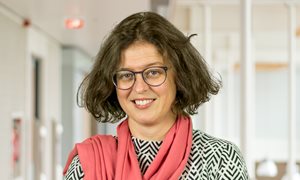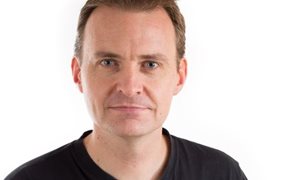
Colin Jacobs Associate Professor AI in Thoracic Oncology
In conversation with ... Colin Jacobs
Colin Jacobs is Assistant Professor within the Department of Medical Imaging of the Radboud University Medical Center. Within the Diagnostic Image Analysis Group, he leads the research line on lung cancer image analysis. We are curious to know why he chose Radboudumc exactly and why the facilities for a researcher in the field of Artificial Intelligence (AI) are special here.
Why did you continue your career at the Radboudumc?
“Radboudumc offers me a unique environment to conduct my research on artificial intelligence for lung cancer. Early detection and treatment of early stage lung cancer is a spearhead of our hospital, where there is a good collaboration between the Departments of Medical Imaging, Pulmonary Diseases, Radiotherapy, Cardio-Thoracic Surgery, and Medical Oncology. Furthermore, within the Diagnostic Image Analysis Group we have built a staff with broad knowledge in the field of artificial intelligence in healthcare and together we have built a strong foundation to support our research.”
And how do you like that now, what has it given you to work in this very environment?
“For me, it is crucial that I can see and optimize the impact of my research on healthcare. A lot of research around artificial intelligence takes place at technical universities, and that makes it harder to optimize the applicability of the research. By actually working in an academichospital and doing research, the lines to the clinic are much shorter, and it provides domain knowledge that allows the research to be more quickly translated to the clinic.”
And what does the Radboudumc have in this AI ecosystem that makes it unique to you?
“The Radboudumc has made AI a focus within the organization. As a result, the hospital is at the forefront of AI for healthcare. Examples include the two Nijmegen spin-offs Thirona and Screenpoint, and the AI for Health lab.”

Alain van Gool Professor Personalized Healthcare
In conversation with ... Alain van Gool
Alain van Gool is professor Personalized Healthcare and heads the Translational Metabolic Laboratory at Radboud University Medical Center, with a strong passion in the application of biomarkers in translational medicine and personalized healthcare. His professional background since 1991 is a mix of academia, pharmaceutical industry, applied research institutes, university medical centers. He has been leading technology-based biomarker laboratories, cross-functional expert teams, therapeutic project teams and public-private consortia. We are curious to know why exactly he chose Radboudumc and why the facilities for a researcher in the field of Artificial Intelligence (AI) are special here.
We are curious, why did you continue your career at the Radboudumc?
“After years of working in academia, industry and research institutes, an umc environment is the ideal place where research, innovation and education meet patient care. This makes it an ideal environment for me because it allows you to have a direct impact on people's lives and health. The person-centered and innovative approach of the Radboudumc also appeal to me greatly. Moreover, it is a very accessible environment where you can work together with colleagues in an approachable and pleasant way.”
And how do you like that now, what has it given you to work in this very environment?
“I have been working with molecular biomarkers and omics data for many years, where it is clear that the real added value comes only when we can combine it with other personal data such as health history, lifestyle and environment. That goes far beyond regular statistics and I expect a lot from AI as a method to create more knowledge there for more impact on healthcare. Because the Radboudumc is leading in the AI field, it is very interesting for my work to join this and explore the possibilities.”
And what does the Radboudumc have in this AI ecosystem that makes it unique to you?
“In the Radboud AI ecosystem with colleagues from the Radboudumc and other faculties, we bring together a lot of AI knowledge from various fields that can accelerate methods and applications. And it is precisely this acceleration that can have an impact on patient care, and that is what we are doing it for, after all.”
Join our team!

Iris Nagtegaal Professor Gastrointestinal Pathology
In conversation with ... Iris Nagtegaal
Iris Nagtegaal is professor of Gastrointestinal Pathology at the Radboud University Medical Center. Her research focused on colorectal cancer, where she works at the intersection of histology, molecular biology, epidemiology, microbiome and computational pathology. Also, she is heading the Radboudumc research theme Tumors of the Digestive Tract. We are curious to know why exactly she chose Radboudumc and why the facilities for a researcher in the field of Artificial Intelligence (AI) are special here.
Why did you continue your career at the Radboudumc?
“After my postdoctoral fellowship of the Dutch Cancer Society, where I worked in Houston (USA) and London (UK), I wanted to return to an environment where I could develop my own research line, with input from clinical collaborators as well as translational researchers. The possibilities in the Radboudumc are optimal: we have a dedicated Laboratory for Tumor Genetics as well as the larges Diagnostic Image Analysis Group In Europe. Here I can combine the best of both worlds and make significant progress and impact in patient care.”
And how do you like that now, what has it given you to work in this very environment?
“My research group is the best! It is a diverse, multidisciplinary, international group, that consists of many curious, ambitious people, that are open to novel ideas and techniques. We are really bringing biology and Atificial Intelligence together. By using large clinical and pathological datasets, developing novel algorithms and adding innovative biological insights, we have direct impact on patient care. That is a unique setting, here at the Radboudumc.”
And what does the Radboudumc have in this AI ecosystem that makes it unique to you?
“While my own research focus is not on AI, I work closely together with the Digital Image Analysis Group, which gives me the opportunity to follow the latest innovations. By working together, we can focus on the most relevant areas in cancer research and diagnostics. The multidisciplinary approach really allows us to make a real impact on healthcare.”
Join our team!

Jeroen van der Laak Professor of Computational Pathology
In conversation with ... Jeroen van der Laak
Jeroen van der Laak is Professor of Computational Pathology at Radboud University Medical Center. He is also guest professor at the University of Linköping, Sweden. He studied the use of computer software for analysis of medical images for almost 30 years. We are curious to know why exactly he chose Radboudumc and why the facilities for a researcher in the field of Artificial Intelligence (AI) are special here.
Why did you continue your career at the Radboudumc?
“I studied computer science and have always had a broad interest. Combining a strong academic environment with a medical center, Radboudumc allowed me to apply my skills to medical research, where the work you do, can be of help to people with sometimes severe illnesses. For me, this makes the work much more rewarding.”
And how do you like that now, what has it given you to work in this environment?
“Innovation is one of the core values of Radboudumc. It is a great place to work, very multidisciplinary, which means that you’re not an isolated researcher. You interact on a daily basis with your colleague researchers, clinicians, lab technicians and many others. Seeing the bigger picture also helps to work on real solutions for real problems, and get the right people and access to important data to accomplish impact for patients.”
And what does the Radboudumc have in this AI ecosystem that makes it unique to you?
“In the last 10 years, we have grown into a mature AI research environment, with a large group of AI researchers, a dedicated team of research software engineers, and all the required storage and compute hardware. We have collected valuable data sets and, in collaboration with our clinicians, enriched these with annotations of all sorts. This creates a highly stimulating environment, where everyone is stimulated to learn and grow and develop their own line of research.”
Join our team!

Geert Litjens Professor Computational Pathology
In conversation with ... Geert Litjens
Geert Litjens is a Professor of Computational Pathology at the Radboud University Medical Center. His research is at the intersection of machine learning, medical imaging, and oncology. Besides he is co-chair of the Computational Pathology Group, which develops automated machine learning systems for cancer detection, biomarker discovery and quantification, and improved prognostication. We are curious to know why exactly he chose Radboudumc and why the facilities for a researcher in the field of Artificial Intelligence (AI) are special here.
We are curious, why did you continue your career at the Radboudumc?
“After my postdoctoral fellowship in Heidelberg, I wanted to return to a clinical environment where you can directly put your AI research into practice, but where you can also discover relevant applications by interacting with the most important end users: the doctor and the patient. And the Radboudumc is such an environment.”
And how do you like that now, what has it given you to work in this very environment?
“It has mainly given me the opportunity to work in an interdisciplinary environment where your research can have a direct impact. In addition, as a researcher in the field of Artificial Intelligence in the medical sector, access to good data is essential to be able to answer relevant questions, and this is well arranged within the Radboudumc.”
And what does the Radboudumc have in this AI ecosystem that makes it unique to you?
“My own research area focuses on applications of AI in pathology, so on microscopic images of tissue from cancer patients, for example. Radboudumc is unique in having a complete digital infrastructure in the pathology department, but in doing so it also has a research group of more than 60 researchers in the field that is world-leading in terms of AI for medical images. This together provides a critical mass that allows us to make a real impact on healthcare.”

